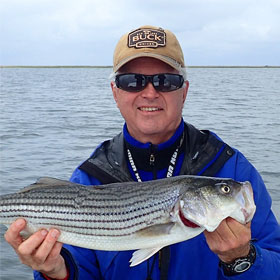10 Things Recreational Anglers Can Learn From Commercial Fishing Safety Issues
By Ken Schultz
Sep 11, 2018
Recreational anglers can stay safe and learn from commercial fishing safety issues by following this important list of boating and fishing dos and don’ts
The popularity of television shows about ocean storms and high-seas adventures has helped focus attention on commercial fishing safety as well as the hazardous nature of commercial fishing. This particular saltwater fishing activity can be especially dangerous due to turbulent seas and the type of gear used.
While offshore fishing safety matters are seldom identical for recreational anglers, here are some commercial fishing safety practices that the best commercial vessels follow and which all recreational anglers should adhere to:
1. Keep a well-maintained Boat
Engine malfunction, electrical problems, and inoperable bilge pumps are just some of the major problems that can cripple a boat, and the magnitude of trouble is amplified in rough seas.
2. Keep Safety Gear in tip-top Condition
This especially means having PFDs in good shape and appropriate for the user, as well as having unexpired safety flares and fire extinguisher. Depending on the vessel, and especially for offshore fishing safety, it might also mean having a properly functioning life raft and distress-signalling device (like an EPIRB or PLB). The U. S. Coast Guard Auxiliary conducts free courtesy safety inspections. Contact a local chapter to have your boat inspected.
3. Don’t Overload
Commercial fishing safety problems sometimes occur because too much weight (gear and/or fish) is loaded on the boat. For recreational anglers, that may mean excess passengers and gear. Abide by the capacity recommendations on the boat’s BIA certification plate (required by law).
4. Give Someone your Day plan
Let someone know when you’re boat is leaving and returning, and where you intend to go. Yes, things often change, but if you don’t return a reasonable time after you’re expected, searchers will have an idea where to start looking.
5. Wear a PFD
Most recreational anglers don’t wear one. But if there is any sign of a potential problem - such as a looming squall, increased wave activity, approaching obstacles - put your PFD on and secure it ahead of time.
6. Have a Working Marine Radio
A cell phone will likely not have service while offshore. The best way to communicate that you’re in distress and need help is via a marine radio. Some have a mayday call button.
7. Make Good Decisions
Operator errors account for the majority of serious boating problems. I was once 18 miles offshore on a 42-foot charter boat when a severe storm came up suddenly. Waves crashed over the bow, one of them sweeping 200 feet of coiled anchor rope overboard. The rope tangled in one of the engine’s two propellors, damaging the shaft and creating a water-seeping crack under the hull. It severely hampered the captain’s ability to control the boat and put us in significant danger. We limped home. Leaving the anchor rope on the bow was an avoidable and costly mistake.
8. Stay Sober - no alcohol or drugs
Statistics indicate that the use of alcohol or drugs is a prominent factor in boating accidents and fatalities. The chance of making bad decisions increases greatly when alcohol and marijuana are used. Boat operators and passengers need to have a clear head if or when something goes wrong.
9. Don’t get Pulled overboard
Being pulled overboard by getting caught in gear is a well-known commercial fishing safety issue. Big-game anglers have also been pulled overboard, usually by wrapping leader wire around their wrist or forearm while landing a big fish. Many of them have drowned or been severely injured. Learn the proper techniques for this specialized activity and be especially careful. Or leave it to an experienced companion.
10. Heed Weather Forecasts
Avoid going fishing in severe sea conditions. Don't unnecessarily put yourself in a troublesome situation. Few recreational anglers spend days or weeks at a time at sea like commercial fishermen. Pay attention to the weather, especially wind conditions, and make a good decision: avoid the worst conditions by staying in port.
Get more information on boating and water safety, boat safety courses, boat safety equipment and more safety tips.









